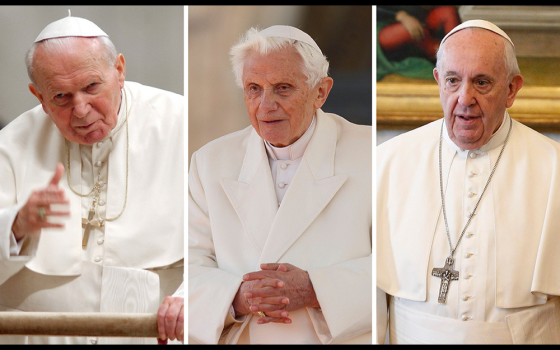I once asked one of the smartest theologians I know to explain to me the essential point of disagreement between Rahner and the Communio theologians. “Of course, Pope Benedict always had great respect for Rahner,” my learned friend said. “But, I would put the difference this way. For Rahner, the Incarnation is a theological category. For Communio theologians, the Incarnation is first and foremost an event.” If that is true, and I believe it is (not being a theologian, I rely on the wisdom of others), than St. Luke was the first Communio theologian.
Tomorrow night, at Midnight Mass, we will hear the Gospel of St. Luke proclaimed. Luke provides us with the narrative of the birth of Jesus that has become so central to our contemporary celebration of Christmas. Joseph needing to pay his taxes. No room at the Inn. The shepherds. The angels. The manger. All of what we know – and Luke was not a Church historian, so I understand that when we say “know” we are not talking about an historical record – about the event of the Incarnation, we know from St. Luke. A few years ago, archeologists reported they had found what they believed to be the bones of St. Luke. I wanted to rush and venerate them and thank him for telling us about the birth of Jesus.
This insight, that the Incarnation is an event, seems to me to be at the heart of the New Evangelization. In his address to the Curia this week, the Holy Father said:
This is a very keen insight. We must make plans and develop programs to launch the New Evangelization, but at its heart must be this invitation to “the encounter with Jesus Christ.” That encounter will be achieved, of course, only by God’s grace, but our role in the New Evangelization must be to serve as credible witnesses to that encounter. We must show the world how that encounter has changed us. We must show how that encounter has caused us to be honest to the desires of our heart, not to settle for a world in which power and profit are the measures of human flourishing, not to settle for a world in which justice is uneven and in which the struggle for justice must be fought for again and again, generation after generation, not to settle for a world in which friendships are betrayed and easy lies are more common than hard truths, and, finally, not to settle for a world in which those we love can be separated from us irrevocably by death.
The Hebrew Scriptures are rich in texture, themes and meaning, but one of the dominant motifs is this human yearning for redemption from such a world. The beautiful prophetic words of Isaiah that we hear during Advent, words set so exquisitely to music by Handel that we can scarcely hear or read them without hearing that music too, those words encapsulate for us the sense of human despair without a savior and the sense of fulfillment and promise the hoped-for savior will bring. In the final analysis, the key to the New Evangelization is simply this: It must be about Him, not about us. Better to say, it is about us only because it is first about Him. The New Evangelization calls all Catholics to ask themselves this question: Can I explain myself without reference to Him who was born in the stable? Does my life make sense, are my choices coherent, are my actions consistent, without Him?
The New Evangelization certainly entails intellectual tasks. But, it is not to be confused with catechesis, although it must include that, nor must it be confused with theology, although it certainly must include that too. The proclamation of the Gospel invites us to this encounter with Jesus, to the event of the Incarnation. It is at once simpler and more complex than catechesis or theology. Simpler because, like St. Luke, it is rooted not in categories but in a story. More complex because it requires us to avoid any of the strands of intellectual manipulation we humans are so good at when we reduce an event, or a person, to an idea. The Virgin Mary did not give birth to a Summa. She gave birth to a child who, in turn, gave birth to a Church. Being a Christian is not, in the final analysis about assenting to this or that proposition. It is about drawing close to that child, and the efforts of all of us to draw close to that child is not a bad definition of what we mean by “Church.”
This Christmas, my wish for all of us is that the celebration of Christmas will lead us closer, more intimately, more decisively, into an encounter with Jesus Christ. After the ornaments, and the turkey, and the gifts, and the carols, this is what matters. Jesus Christ came into the world to save us. We still need to be saved: The evidence of that proposition is all around us. The New Evangelization, like Isaiah, points us to Him who saves, the child in the manger, the Wonder-Counselor, the Prince of Peace. May all the blessings of this most holy season surround you and those you love.


